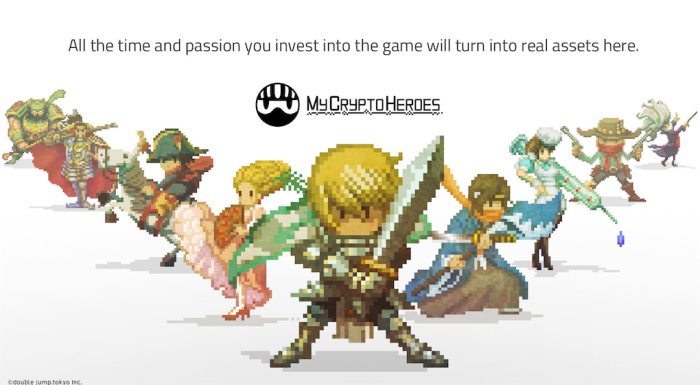
Blockchain-based card games are revolutionizing the gaming landscape, merging traditional card game mechanics with cutting-edge blockchain technology. This fusion creates a unique, secure, and transparent gaming experience where players have true ownership of their digital assets.
As we dive into the world of blockchain card games, we’ll explore popular titles, innovative features, and how they stand in contrast to conventional card games. This exploration will highlight the advantages and challenges that come with integrating blockchain into gameplay, providing you with a well-rounded understanding of this emerging trend.
Overview of Blockchain-based Card Games

Blockchain technology has revolutionized various industries, and gaming is no exception. In the realm of card games, the integration of blockchain provides players with enhanced security, transparency, and ownership of in-game assets. Unlike traditional card games, where players often do not have true ownership of cards or collectibles, blockchain-based games allow players to own unique digital assets that can be traded or sold independently of the game itself.At its core, blockchain technology is a decentralized ledger that records transactions across multiple computers.
This means that once a transaction is recorded on the blockchain, it cannot be altered or deleted, ensuring a high level of security and trust among players. Card games utilizing blockchain leverage smart contracts to automate game mechanics, such as card trading, rewarding players, and managing in-game economies. Some popular examples of blockchain-based card games include “Gods Unchained,” “Sorare,” and “CryptoKitties,” each offering unique features that highlight the potential of blockchain technology in gaming.
Examples of Popular Blockchain-based Card Games
Several blockchain-based card games have gained significant popularity, each showcasing different aspects of blockchain technology. Here are a few notable examples:
- Gods Unchained: This game allows players to own their cards outright, trade them freely, and participate in competitive play without the risk of losing their assets. The game features a play-to-earn model, where players can earn valuable rewards through skill and strategy.
- Sorare: A fantasy football game where players collect officially licensed digital player cards. These cards are unique, and their value can fluctuate based on player performance in real-world matches, creating a dynamic trading environment.
- CryptoKitties: One of the first blockchain games to gain mainstream attention, where players breed and trade virtual cats. Each cat is a unique collectible stored on the Ethereum blockchain, showcasing the concept of true ownership in digital assets.
These games exemplify how blockchain can enhance player experience by providing verifiable ownership and the ability to monetize gameplay.
Advantages and Disadvantages of Using Blockchain for Card Games
Implementing blockchain technology in card games comes with various advantages and disadvantages that are important to consider.The advantages include:
- True Ownership: Players genuinely own their digital assets, allowing them to trade or sell items freely.
- Transparency: All transactions are recorded on the blockchain, providing a clear and verifiable history of ownership and trades.
- Security: Blockchain’s decentralized nature reduces the risk of hacking and fraud, providing a safer environment for players.
- Play-to-Earn Models: Many blockchain games allow players to earn real-world value through gameplay, incentivizing engagement.
However, there are also challenges to consider:
- Complexity: The technology can be complicated for non-technical players, potentially limiting accessibility.
- Market Volatility: The value of digital assets can fluctuate significantly, which may discourage some players.
- Environmental Concerns: Some blockchain networks, particularly those using proof-of-work mechanisms, have faced criticism for their environmental impact.
In summary, while blockchain technology offers exciting innovations for the card gaming industry, it also poses unique challenges that can affect player experience and the overall ecosystem.
Comparison with Traditional Card Games
The evolution of card games has seen a significant transformation with the emergence of blockchain technology. While traditional card games have been rooted in physical decks and face-to-face interactions, blockchain-based card games introduce new mechanics and player experiences. Understanding the differences between these two forms of gaming can help players appreciate the unique advantages and challenges that blockchain brings to the table.Blockchain-based card games leverage the decentralized nature of blockchain to enhance gameplay mechanics.
Unlike traditional card games, which often rely on a central authority or game host, blockchain games operate on peer-to-peer networks. This decentralization ensures transparency and fairness, as the rules are encoded in smart contracts and the outcomes are verifiable on the blockchain. Players own their in-game assets, which are represented as non-fungible tokens (NFTs), allowing for true ownership and the ability to trade or sell these assets on various marketplaces.
Differences in User Experience
The user experience in blockchain-based card games significantly diverges from that of traditional card games. Here are the primary differences that shape player interactions and satisfaction:
Ownership and Control
In traditional card games, players have no ownership of the physical cards once the game is over. In contrast, blockchain games allow players to possess unique digital assets. For example, in games like “Gods Unchained,” players can sell or trade their cards freely, giving them control over their investment in the game.
Gameplay Dynamics
Traditional card games often follow fixed rules and mechanics established by the game publisher. Blockchain games can adapt and evolve more fluidly, as developers can introduce new features via updates on the blockchain, which are instantly available to all players.
Community and Interaction
Blockchain-based games often foster a more engaged community through decentralized governance. Players can vote on changes or new features, directly influencing the game’s development. This contrasts with traditional games where player feedback may have limited impact.
Accessibility
Blockchain card games can be accessed from anywhere with an internet connection and a digital wallet, unlike traditional card games that may require physical gathering or specific locations for play. This accessibility can broaden the player base and facilitate global interaction.
Economic Implications of Asset Ownership
The economic landscape of owning digital assets in blockchain card games presents unique opportunities and challenges compared to physical card games. Understanding these aspects is crucial for players considering their investments:
Value Appreciation
Digital assets can appreciate over time based on rarity and demand. For instance, a rare card in “Magic: The Gathering” might be valued highly, but its transferability is restricted. In contrast, a rare NFT card can gain value in secondary markets, leading to significant profits for the owner.
Liquidity
Blockchain card games offer enhanced liquidity for trading assets. Players can quickly buy, sell, or trade cards on various platforms, facilitating dynamic market interactions. This stands in stark contrast to traditional games, where selling physical cards might involve time-consuming processes.
Investment Opportunities
With the rise of play-to-earn models in blockchain games, players can earn real-world value through gameplay. This economic model allows players to monetize their time and skill, which is rarely feasible in traditional card games that do not offer such economic rewards.
Risk Factors
While owning digital assets presents tremendous opportunities, it also introduces risks associated with market volatility and the potential for digital asset depreciation. Players must navigate these risks carefully, as the value of their assets can fluctuate rapidly based on market trends and player interest.In summary, the comparison between blockchain-based and traditional card games reveals a landscape rich with innovation, user engagement, and economic potential.
As blockchain technology continues to evolve, the way players interact with and value card games is likely to shift significantly.
Exploring Related Game Genres
Blockchain technology is rapidly redefining the landscape of gaming, extending its influence beyond card games into various related genres. This evolution is particularly significant in areas like board games, online games, arcade, and roleplaying games, where the application of blockchain can enhance gameplay, promote ownership, and facilitate new revenue models. Understanding how these genres adapt to blockchain can provide valuable insights into the future of gaming.
Integration of Blockchain in Board and Online Games
The introduction of blockchain into board and online games is reshaping player interactions and ownership experiences. By utilizing smart contracts and decentralized ledgers, players can truly own their in-game assets, which can be traded or sold even outside the game environment. This fosters a community-driven economy and encourages player engagement. Some notable examples include:
- Mythical Games’ Blankos Block Party: This game utilizes blockchain for NFT-based characters, allowing players to collect and trade their unique characters in the marketplace.
- Axie Infinity: A leader in the online gaming space, Axie Infinity allows players to breed, raise, and battle creatures called Axies, with ownership secured through blockchain technology.
These games demonstrate the potential for blockchain to create value for players beyond the confines of traditional gaming environments.
Integration of Blockchain in Arcade and Coin-Op Games
The integration of blockchain technology in arcade and coin-operated games is gaining traction, offering new ways for operators to engage customers and streamline transactions. Utilizing blockchain can enhance transparency in revenue sharing between game developers and operators, leading to fairer profit distribution.An exemplary case is:
- Bitcade: A blockchain-powered arcade that allows players to earn cryptocurrency by playing games, thus blending traditional arcade experiences with modern financial incentives.
This model not only attracts new players but also retains existing ones by introducing an innovative way to reward gameplay.
Future of Blockchain in Roleplaying and Video Games
The potential for blockchain in roleplaying and video games is vast, opening avenues for player-driven economies and immersive experiences. As developers begin to experiment with immutable game worlds and decentralized storylines, the gaming landscape may shift dramatically.Predictions for the future include:
- Enhanced Narrative Experiences: Writers may utilize blockchain to create branching storylines where player choices are recorded on the blockchain, affecting future gameplay and maintaining a consistent narrative across all players.
- Expanded Asset Ownership: Players could own complex digital assets like character skins or virtual real estate, allowing for trade and investment opportunities in a decentralized marketplace.
These advancements highlight the transformative power of blockchain, suggesting that future games may be more interactive and player-centric than ever before.
Last Word

In summary, blockchain-based card games not only offer a fresh approach to gameplay but also enhance player engagement through digital ownership and transparent mechanics. As the industry continues to evolve, the future of gaming holds exciting possibilities, making it a space worth watching for enthusiasts and developers alike.
Essential FAQs
What are blockchain-based card games?
These are digital card games that use blockchain technology to secure in-game assets and transactions, giving players true ownership of their cards.
How do I acquire cards in these games?
Players can acquire cards through purchasing, trading, or winning them in gameplay, often using cryptocurrencies.
Are blockchain card games free to play?
Many blockchain card games are free to start, but some may require initial investments to purchase cards or assets.
Can I trade my cards with other players?
Yes, trading is a fundamental aspect, enabling players to exchange cards securely on the blockchain.
What makes blockchain card games different from traditional ones?
Blockchain games offer true ownership of in-game assets, while traditional games do not, as assets are typically controlled by the game developers.




